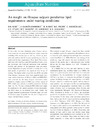Identificador persistente para citar o vincular este elemento:
https://accedacris.ulpgc.es/jspui/handle/10553/106631
| Título: | An insight on Octopus vulgaris paralarvae lipid requirements under rearing conditions | Autores/as: | Reis, D.B. García-Herrero, I. Riera, R. Felipe, B.C. Rodríguez, C. Sykes, A.V. Martín, M.V. Andrade, J.P. Almansa, E. |
Clasificación UNESCO: | 251092 Acuicultura marina | Palabras clave: | Artemia sp. juveniles Decapod crustacean zoeae Lipid requirements Octopus vulgaris Paralarval rearing |
Fecha de publicación: | 2015 | Publicación seriada: | Aquaculture Nutrition | Resumen: | In this study, two new alternative preys: Grapsus adscensionis zoeae (as sole prey) and Palaemon elegans zoeae (in cofeeding with Artemia sp.), as well as, Artemia sp. juveniles were used as feed for octopus paralarvae, as a way to understand its lipid requirements. Total lipid (TL) content, lipid class (LC) and fatty acid (FA) profiles of preys, octopus hatchlings and 9‐day‐old paralarvae were analysed. Growth and survival of the paralarvae were also determined. Regardless the prey provided, a notable shift in the lipid profile of paralarvae was registered after 9 days of rearing. The highest index of growth rate (IGR) recorded when decapod crustacean zoeae were supplied might have some relation with levels of 20:4n‐6 (ARA) and DHA/EPA ratio observed. In this sense, Grapsus adscensionis zoeae leaded to a higher content of ARA and a lower content of EPA, which may indicate a possible competition between these two FA. For that a balanced EPA/ARA ratio might be significant in this species nutrition without disconsidering DHA levels as an essential fatty acid. Finally, the changes observed in paralarvae FA profile might not only be related to prey FA profile, but also with changes occurring in the lipid classes contents. | URI: | https://accedacris.ulpgc.es/handle/10553/106631 | ISSN: | 1353-5773 | DOI: | 10.1111/anu.12205 | Fuente: | Aquaculture Nutrition [ISSN 1353-5773], v. 21, p. 797-806 |
| Colección: | Artículos |
Citas SCOPUSTM
29
actualizado el 08-jun-2025
Citas de WEB OF SCIENCETM
Citations
24
actualizado el 15-feb-2026
Visitas
198
actualizado el 15-ene-2026
Descargas
37
actualizado el 15-ene-2026
Google ScholarTM
Verifica
Altmetric
Comparte
Exporta metadatos
Los elementos en ULPGC accedaCRIS están protegidos por derechos de autor con todos los derechos reservados, a menos que se indique lo contrario.
